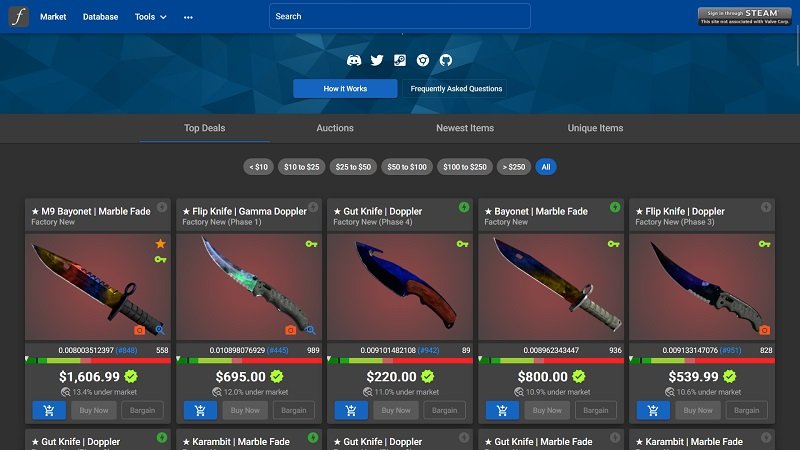A unique market has grown around skins on the Steam platform in recent years – besides their collectible value, they also have a real monetary value. Today, we take a closer look at the marketplaces where these cosmetic gaming accessories are bought and sold.
Marketplace with skins

One of the best online marketplaces for skins is, in our opinion, CSGOFloat
By adding skins (cosmetic accessories) to their games (Counter-Strike 2, DOTA 2, Team Fortress 2), Valve launched a project that has grown to massive proportions. Today, there is no video game player who hasn’t heard of skins. To a lesser extent, they have also appeared in other games not on the Steam platform. In World of Warcraft, for example, you can get a skin for your mount, and in League of Legends, you can change the appearance of your character. The main difference is that these skins are not on Steam and cannot be transferred from account to account – this is the feature that enables trading. The ability to freely manage your items in the Steam inventory.
The best sportsbooks
Official Steam marketplace
Valve appointed itself as the intermediary and launched its Steam marketplace, which became the first sales and purchase place for skins. This allowed players themselves to set selling prices, and the market began to operate on basic economic principles. The digital distribution platform became a trading place among the players themselves. The price reflected the rarity of skins, and soon the first people willing to pay high amounts for skins appeared. Valve charged small fees for the trades made, but the main issue was that the money for the sold product could only be used on Steam. When you sell an item that can pay your monthly rent, you want to have the money in your account and not in the Steam wallet. Based on this, alternative secondary marketplaces emerged that allowed you to convert skins to real money.
Alternative secondary marketplaces
Every opened case in CS means a new skin. Today, there are just over 600 million of them (in publicly accessible inventories alone) with a total value of 1.5 billion dollars. Such a large number of cosmetic accessories means only one thing: a huge number of people involved in the market environment. In the large community, many individuals sought additional opportunities to value skins. As a result, secondary marketplaces and gambling sites began to emerge, where Counter-Strike skins became the main currency. Among the first were marketplaces like BitSkins or CS.Money, but many were created, some didn’t last long, and others were fraudulent sites aiming to scam skins from unsuspecting players. The last mentioned type of websites still persists today, and that’s why we decided to establish a part of our review website that focuses on game skins and related sites. We went through a lot of sites and reviewed them all. This way, you know which platforms are legitimate and which are scams. Most trading platforms buy skins and then resell them, but there are also those that act as intermediaries and, for a small fee, list your offer (P2P marketplaces, peer-to-peer). Some marketplaces focus only on Counter-Strike and offer many extra features (e.g., CSGOFloat or TradeIt), others are backed by well-known brands and names from the esports community (GamerPay or Skinbid), and others allow trading skins from games like DOTA 2 or Rust (BUFF Market, Skinport, and DMarket). However, they all operate on the same main principle: skins for real money (buying and selling).
Can you make money with CS2 skins?
Making trading game skins a full-fledged business is possible, but you need to approach it like a normal business and investment. This means constantly monitoring the market, demand, and making profitable trades. Alternatively, you need to be lucky and open only expensive skins from cases – but that’s like playing the lottery. Very few people become successful traders, and at the end of the day, the most profit is made by the sites that facilitate these trades. Collectors, sellers, and marketplace operators all face the same challenges.
Challenges of the game skins market environment
As with any other market environment, there are certain risks here as well. The most feared by all investors is the possible price drop. This can be caused, for example, by a decline in the game’s popularity, which is fully in the hands of the developers. At the same time, the demand for skins can also decrease. Although the release of Counter-Strike 2 elegantly avoided this problem (transferring skins from CS:GO to CS2), one day the day may come when a new version of the game is released that no longer supports skins (but we’re talking about a period that won’t come soon, because Valve also makes money from skins). The moral issue that the gaming community faced a few years ago was the possibility of gambling without identity verification. The currency here was, of course, skins, and minors could access online slot machines and betting. Many platforms of that time were audited by the responsible authorities and Valve, and many online casinos and marketplaces did not survive this period (tax frauds, minors participating in gambling, unlicensed gambling operations, unregistered businesses…). The last major challenge is what many players fear – frauds and scams. It should be said that the safest place to sell or buy skins is the Steam platform and its marketplace. Although most secondary marketplaces are legitimate businesses, there may occasionally be a site that takes your skins but doesn’t give you anything in return. Also, be careful with whom you trade on Steam.
List of trusted skin marketplaces
 | BitSkins | BitSkins review |
 | BUFF Market | BUFF Market review |
 | CS.Deals | CS.Deals review |
 | CS.MONEY | CS.MONEY review |
 | CSGOFloat | CSGOFloat review |
 | CS.TRADE | CS.TRADE review |
 | DMarket | DMarket review |
 | GamerPay | GamerPay review |
 | GC.Skins | GC.Skins review |
 | Lis-Skins | Lis-Skins review |
 | LootBear | LootBear review |
 | LOOT.Farm | LOOT.Farm review |
 | Mancco.store | Mannco.store review |
 | MarketCSGO | MarketCSGO review |
 | ShadowPay | ShadowPay review |
 | SkinBaron | SkinBaron review |
 | SkinBid | SkinBid review |
 | SkinCashier | SkinCashier review |
 | Skinport | Skinport review |
 | Skins.Cash | Skins.Cash review |
 | SkinsMonkey | SkinsMonkey review |
 | Swap.GG | Swap.GG review |
 | TradeIT | TradeIT review |
 | Waxpeer | Waxpeer review |


Discussion, comments and your experiences
Share your opinion, ask a question, or offer advice to others in the moderated discussion. Editors also participate, but they respond based on their current availability. If you expect a direct response, we recommend using email communication instead.